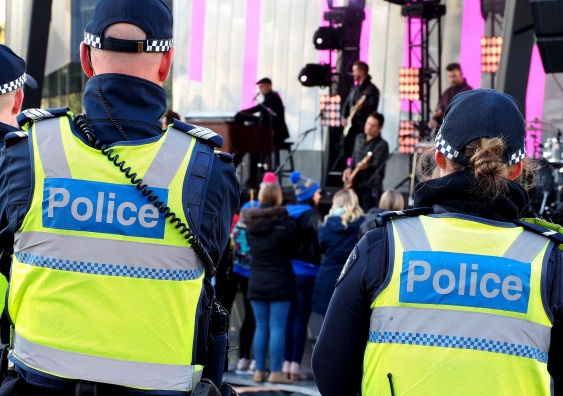Strip searches, STMPs: more evidence of excessive police power
Reports from the police watchdog on strip searches and the controversial Suspect Targeted Management Plan confirm growing concerns, say two UNSW Law researchers.
Reports from the police watchdog on strip searches and the controversial Suspect Targeted Management Plan confirm growing concerns, say two UNSW Law researchers.

Diane Nazaroff
UNSW Media & Content
+61 (2) 9385 2481, +61 (0)424 479 199
diane.nazaroff@unsw.edu.au
There is a concerning culture of strip-searching by NSW Police that is uninformed by the law, according to two UNSW Law researchers.
Dr Vicki Sentas and Dr Michael Grewcock say a Law Enforcement Conduct Commission (LECC) report released yesterday raises a number of concerns about strip searches in custody and in the field.
“It is extraordinary that there are over 100 different police guidelines on when police can use a strip search, that are inconsistent, confused and, at times, contrary to law,” Dr Michael Grewcock says.
“The LECC recommended that NSW Police create one consistent guideline. But these issues need to be fundamentally resolved through law reform, not left to the police. The LECC confirms that there is a culture of strip-searching uninformed by the law and this is being transferred into the field as well as in custody.”
 Dr Michael Grewcock.
Dr Michael Grewcock.
The LECC reviewed 113 local Standard Operating Procedures (SOPs) for strip searches in custody. It found that 60% of all SOPs contain no guidance on the recording of reasons for a strip search.
Dr Sentas says the instruction that police provide for conducting strip searches is seriously inadequate and supports the case for law reform.
“There is no consistent guidance from NSW Police on the legal requirements to strip search either in custody or in the field,” she says.
Dr Sentas and Dr Grewcock released the first legal study on strip searches in August last year, documenting patterns of systemic unlawful police use of the strip search power.
The UNSW researchers have urged Parliament to reform the law in order to clarify and limit the circumstances in which strip searches can be conducted.
They say that the LECC recommendation that NSW Police resolve these questions by improving their guidelines is insufficient on its own to respond to the problem.
“The LECC found that the practice of police directing people to squat and cough has no legal basis and confirmed our report analysis that the practice is unlawful,” Dr Vicki Sentas says. “Parliament needs to urgently legislate to outlaw this humiliating practice.”
She says the LECC report and its public hearings revealed that NSW Police have paid little regard to the legal requirement to ensure a suitable adult is present when a child is strip-searched.
“This reflects a wider failure to acknowledge the vulnerabilities of children in this situation. The law should be changed to require a court order before a child can be strip-searched.”
Dr Sentas says another LECC report highlighted the controversial Suspect Targeted Management Plan (STMP) as “a troubling grey zone” outside of the law.
The LECC released an interim report on the STMP in relation to children yesterday.
Dr Sentas says the report confirms concerns raised in a Youth Justice Coalition study she co-authored with the Public Interest Advocacy Centre in 2017.
 Dr Vicki Sentas.
Dr Vicki Sentas.
The study exposed the STMP as a pre-emptive policing strategy that targets those suspected of future potential offending with intensive surveillance and coercive police interactions like stop-and-search and home visits.
The LECC examined 429 children on the STMP in a two-year period and found patterns of targeting that have led to unreasonable unjust and oppressive interactions for young SMTP targets.
It found the targeting process has introduced unacceptable risks of bias, and that the STMP is not fit for purpose.
"Significantly, the LECC finds that the STMP involves intrusive tactics and unreasonable surveillance of children and young people,” Dr Sentas says.
“It confirms our 2017 research, that found police use a child’s STMP status as a basis for ongoing and repeated stops and searches instead of following the legislation.”
Almost three-quarters of the cohort under study were characterised in police records as “possible ATSI (Aboriginal and Torres Strait Islander)”. Yet the LECC says NSW Police dispute that figure and estimate it is more likely to be 47%.
“Whether we take the police or the LECC’s competing figures, somewhere between half to three-quarters of all children on the STMP are Aboriginal or Torres Strait Islander,” Dr Sentas says.
“The discriminatory targeting of Indigenous children causes immense harm and must stop. The immediate suspension of the STMP for all children is justified.”
The LECC report says NSW Police are evaluating a revised and improved version of the STMP that it says will address all concerns raised by the commission.
“The LECC makes a number of recommendations it considers would improve the STMP, but this tool is highly inappropriate for children and should be abandoned altogether,” Dr Sentas says.
“Best practice in supporting children from offending requires holistic, tailored support for families from social services and culturally appropriate community-based support, not subjection to harmful forms of policing.”
Dr Sentas was disturbed that the LECC found the lack of details in police records to be so insufficient, that the LECC couldn’t tell if police were using a police power or relying on consent, or whether the power was justified or not.
“The problem is not simply, as the LECC put it, that the nature of the interactions between police and those targeted are neither clear nor accountable,” Dr Sentas says.
“The lack of police understanding of their lawful powers and the systemic lack of regard for proper documentation underscores the STMP program is a troubling grey zone that sees itself as outside the law.”